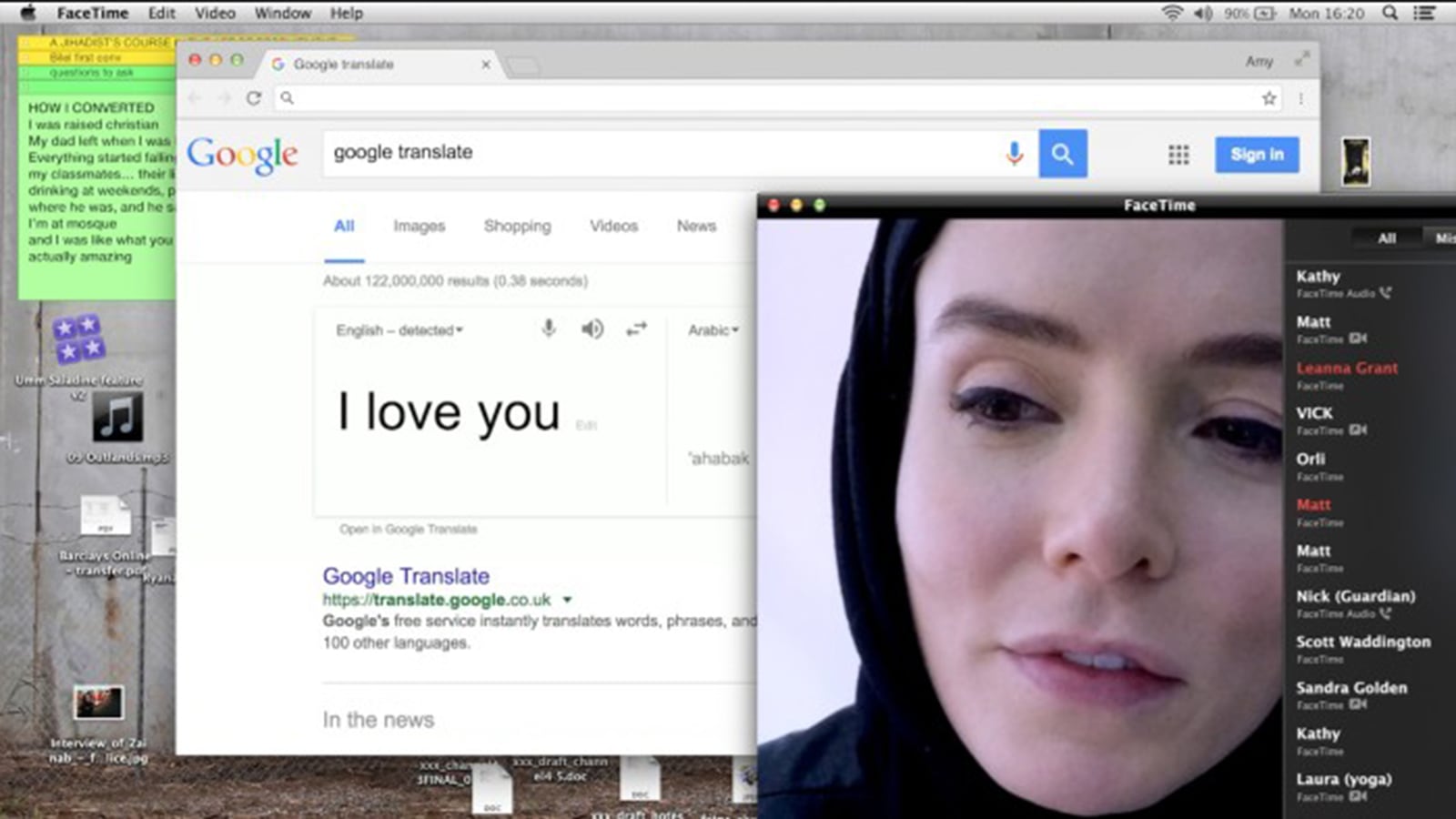Writer/director Timur Bekmambetov’s breakthrough Russian fantasy epics Night Watch and Day Watch were so heavily indebted to Hollywood productions that it made sense when he subsequently gravitated to America for Wanted and Abraham Lincoln: Vampire Hunter. Yet having made his name with conventional blockbuster productions, Bekmambetov has in the past few years carved out a more unique path for himself, producing works—including Unfriended and its sequel Unfriended: Dark Web, as well as the John Cho-led Searching—that play out entirely on a computer screen. Known as Screen Life, it’s a format that seeks to tell stories about our 21st-century device-filtered reality by translating our digital experiences to the movies.
The latest in Bekmambetov’s ongoing venture is Profile, a new inspired-by-real-events thriller which he directed for the big screen, where it’ll premiere on May 14. Nonetheless, it’s hard to imagine a film better suited for at-home viewing—especially on a desktop, tablet or smartphone—than this, since its entire tale takes place on the laptop of Amy Whittaker (Valene Kane), a British journalist working on an exposé about the growing trend of Western women traveling to Syria to join up with ISIS. Sparked by a recent incident in which a young, blonde English teen went from playing guitar in YouTube videos to journeying to the Middle East to marry a jihadist, Amy seeks to find out both what compels women to choose such a future and, more importantly, the logistical process that ISIS recruiters employ to ferry their converts from Europe to Syria.
Amy has sold this story as a freelancer to her editor Vick (Christine Adams), and her reporting entails perpetrating an online ruse in which she poses as a young radical eager to take up ISIS’ cause. Profile’s first few minutes depict her concocting a new digital persona for this scheme, which involves creating a pseudonym and a fake Facebook account (replete with a profile image of Snow White in a hijab), and then sharing a post by notorious ISIS fighter Abu Bilel Al-Britani (Shazad Latif), who made headlines when he left London for the murderous company of the Islamic State. Amplifying Bilel’s content is all it takes to attract his attention; he immediately messages her and begins inquiring about her situation. What Amy tells him is a sob story—about her parents’ abandonment, her disgust with her Western peers, and her desire for something more fulfilling—that she’s culled from a video on YouTube, which is where she also learns makeup tips to appear younger, and how to properly wear a hijab.
Profile details this with rapid-fire swiftness, as Amy switches between her web browser, iMessage, Skype, and hard-drive photos and videos like a master digital juggler. Notifications constantly intrude upon what she’s doing at a given moment, be it from her friend Kathy (Emma Cater), who wants advice about dresses for an upcoming party, or from her boyfriend Matt (Morgan Watkins), who’s trying to find a new apartment for them and their noisy dog Sparky. The film incessantly flip-flops between Amy’s numerous points of screen interest as she googles things and messages bosses while simultaneously carrying on Skype calls that she’s recording—either by herself, or with the aid of IT guru Lou (Amir Rahimzadeh), with whom she shares her desktop. It’s akin to a blitzkrieg of fast and furious digital action, forcing one’s eyes to dart around the frame in sync with Amy’s conduct.
As Amy strikes up an increasingly close relationship with Bilel, Profile becomes a portrait of the internet as a vehicle for forming both authentic and phony identities. That process is, in one respect, extremely easy, since it only entails setting up new accounts on social media platforms and on your own computer. Amy’s ensuing ordeal, however, also underlines the difficulty of maintaining such a ruse in a world where everyone has access to the same tools, knows the same tricks, and is able to make inquiries that put cons in jeopardy. Bekmambetov generates tension from simple requests from Bilel to Amy (which require her to quickly create and/or manipulate her digital circumstances), as well as from unexpected calls and messages that threaten to destroy the fanciful fiction that Amy is creating in real time with Bilel as he promises her a happy life together in war-torn Syria.
Despite his lovey-dovey talk and reassurances about the bliss and safety that await her, Bilel is clearly a cunning viper engaged in his own dangerous fraud, thus further marking Profile as a canny, multifaceted snapshot of digital deception. Moreover, the fact that Amy soon begins to lose sight of herself and fall under Bilel’s spell speaks to the seductive power of online lies and radicalization. Amy knows that Bilel’s every word is false and yet the further she commits to this role-playing scam, the more his pledges of love and matrimony begin to sound authentic—a twist that gets at the persuasiveness of even the most obvious internet bullshit.
Bekmambetov executes his formal gimmick with a speed and urgency that maintains suspense, although at 106 minutes, it eventually grows a bit wearisome—one can only take so much of this claustrophobic structural gambit before starting to crave a camera pan or a view outside that isn’t spied via a QuickTime player. Thankfully, Kane and Latif’s lead performances alleviate some of that limited-perspective monotony, exhibiting a charisma—and sly deviousness—that captures the dangerous allure of believing everything you see on your screen. Despite Amy’s somewhat less-than-wholly plausible late behavior, the two develop a chemistry that proves crucial to the film’s success as an examination of complex modern online dynamics.
Set less to Amy’s streaming-music playlist than to a soundtrack of clicks, beeps, rings and other familiar notification sounds, Profile boasts a fundamental understanding of How We Live Now but never succumbs to preachiness or corny handholding in conveying its core ideas. From Bilel’s fondness for posting cat GIFs and memes—which Amy recognizes as a deliberate recruitment tool—to Amy’s deciphering of a photo’s coded meaning, the film mines the new world internet order for a harrowing saga about the thin line between who we are and who we pretend to be when we log on, and the peril that such confusion can put us in even once we’ve logged off.


